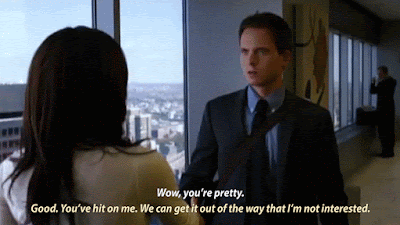This guide and all of my reviews contain occasional bits of rude language,
and opinions some people might find offensive but for which I won’t apologise.
Don’t read any further unless you are open-minded.
 -----------------------------------
-----------------------------------Suits TV Series 2011 Ongoing U.S.A. --DVD, Netflix
Lawfirm chatfest held together by soapy melodrama, hokiness, and wit.
Mike Ross has never been to law school but talks his way into a job with a prestigious New York City Law Firm. His immediate boss, Harvey Specter, juggles the twin challenges of mentoring Mike and keeping Mike’s lack of qualifications a secret. This is Lord of the Flies meets Waiting for Godot on steroids.
We only need three adjectives to explain 80% of all there is to know about Suits: it’s a talkfest, it’s witty, and it’s a soapie.
The Manhattan law firm for which most of the characters work is a practice specialising in negotiating and deal-making rather than going to court. A lot of the “action” consists of people- talking while sitting,
- talking while walking, or
- talking about what they should say when it’s time to talk.
Despite the usual law-firm intrigues for control of status and clients, nothing much happens but somehow the dialogue just keeps coming. There is a limited range of standard interior set-ups, for example, e.g. Jessica and Harvey walk towards each other then stop at reception to exchange two lines before they walk on. There are movie quoting competitions, slabs of free life coaching and tonnes of character-driven wit that make the series work even when the already-thin episode storylines lack credibility.
Harvey: “Do you know how we won World War Two?”
Mike: “Yeah, of course. Spock didn’t let Kirk save Joan Collins from getting hit by that car.”
Harvey is 40ish, white, suave and a James Bond Type. His boss is a very tall, attractive black woman named Jessica Pearson, and Harvey respects her; he doesn’t care about her race and is not threatened by her gender. Gender and race are rarely issues on this show, which is to say it is not based in the real world but mostly avoids stereotypes. (Suits is no morality play).
Suits is set in NYC where rents are high, and Jessica wears a new bespoke outfit every time she appears on screen, so the default setting is privilege; only Harvard graduates are hired as lawyers, but there is no class divide on this show – paralegals and other non-lawyers are assumed to have equal value (but not in any lefty kind of way).
People work a gazillion hours a week because life is synonymous with career.
It follows that workmates are family and we rarely become emotionally over-invested in outsiders. I’ve no idea where the series will go when Mike and Rachel are out of the picture because if we were not romancing vicariously through them, what would be left apart from the jokes?
It follows that workmates are family and we rarely become emotionally over-invested in outsiders. I’ve no idea where the series will go when Mike and Rachel are out of the picture because if we were not romancing vicariously through them, what would be left apart from the jokes?
Louis: “You let that man inside your cubicle!”
Once of the things about shows like this, where lifestyles are all about conspicuous consumption, is they provide a good context for stepping back and re-evaluating national accounting systems that hold
GDP
= The Income of Everyone in the Country
= Value of All the Goods & Services Produced
i.e. The more money you are paid the more value you have as a human being. You know – the sort of crap that sounds important in parliamentary debates and makes it seem like democracy would fall if the Harveys of this world could not do their thing, but it would not fall if the pretzel maker went out of business.
The writing is solid enough that my interest didn’t really flag til the 6th series. Posturing and pissing contests aren’t my personal faves unless David beats Goliath but I was happy enough these contests were offset in early seasons by witty exchanges and by the firm bully being a buffoon.
By season 6 the world tilts; Goliath seems to hold all the cards, the kids in what’s left of the law firm just squabble all the time, and after 6 years none of the grownups have learned yet to stop lying to themselves or each other – I found it increasingly difficult to care about them and there were not enough laughs or surprises to make any of it worth enduring.
Nails on a Blackboard: English characters played by real British actors who do not use the words “bring, take, come or go” the way speakers of British English as a First Language would use them.
Bingeability – 6 out of 10. Not something that made me lose sleep wondering what would happen next, but for the first 5 seasons it was entertaining enough.
After bingeing on a whole 6 seasons of this, the biggest laugh is I never once twigged the actor playing Mike (Patrick J. Adams) is the same guy who made my heart sing with happiness for Helena on Orphan Black. Duh.
















































